Coronavirus: British nationals returning from Wuhan to be quarantined for two weeks
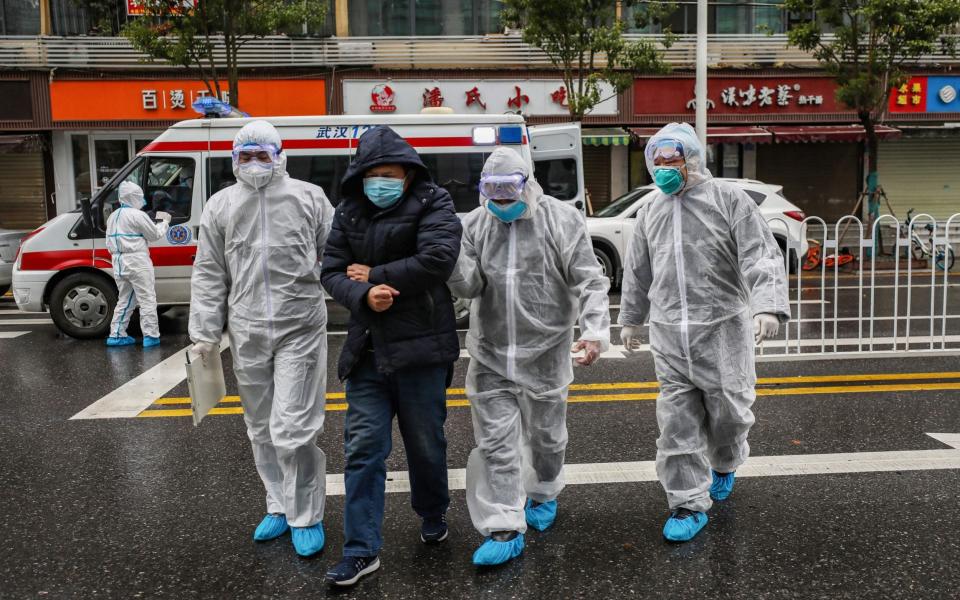
Britain will put people airlifted from China into quarantine amid concerns that around 1,500 people who arrived in the UK since the new year have not undergone checks.
Matt Hancock, the Health Secretary, ordered a “belt and braces” approach to the coronavirus amid concerns that the virus is far more contagious than was thought.
Scientists in China believe that it could be transmitted for up to two weeks before the carrier has any symptoms, such as a fever or cough.
Under the new plans, all 1,500 people who have flown in from Wuhan, the epicentre of the outbreak, since mid-January will be asked to remain in isolation for at least a fortnight.
Health officials are now desperately attempting to track such cases, to make sure they stay in their homes, and limit any spread of the disease.
But it is understood that they only have contact details for one in 10 cases who arrived on such flights.
The Foreign and Commonwealth Office has embarked on a desperate scramble to return another 200 British nationals stranded in Wuhan.
All such arrivals will be be instructed to enter two weeks of isolation, under the new plans.
If they are unable to do this at home, facilities will be set up to ensure they can be safely quarantined.
The change in strategy follows warnings from Chinese authorities that the virus could be transmitted for up to two weeks before any symptoms are visible.
The Chinese city of Wuhan has been on lockdown since last Wednesday, after the rapid spread of a virus which was first reported to the World Health Organisation almost a month ago.
On Monday Public Health England said they expect to see cases in Britain, with the first case likely to come from somebody who is already here.
The agency is already under fire for its efforts to prevent the spread of the virus.
Last week passengers returning to Heathrow from Wuhan and its surrounding areas said they were simply given leaflets advising them which symptoms to look out for.
Ministers have now instructed health officials to take a more robust approach.
All passengers who have been on such flights in recent weeks will be urged to “self-isolate” themselves for at least two weeks after departing China.
British scientists believe around 100,000 people across the globe are likely to be infected by the virus. Only around 2,900 cases have been confirmed - mostly in the city of Wuhan - including around 80 deaths.
Mr Hancock told the Commons: “This is a new disease and the global scientific community is still learning about it. I have directed Public Health England to take a belt and braces approach, including tracing people who have been in Wuhan in the past 14 days.
“Coronaviruses do not usually spread if people don’t have symptoms – however, we cannot be 100 percent certain. From today, as concerns have been raised about limited pre-symptom transmission we are therefore asking anyone in the UK who has returned from Wuhan City in the last 14 Days to self-isolate - to stay indoors and avoid contact with other people – and to contact NHS 111.”
The new advice says anyone who develops symptoms in the UK should call their GP or ring 111.
They are being warned not to leave their homes unless they have been given medical advice.
Public Health England officials are continuing to trace people who have arrived in the UK from Hubei Province.
“Having eliminated those who we know have since left the country, there are 1,460 people we are seeking to locate,” he told the Commons.
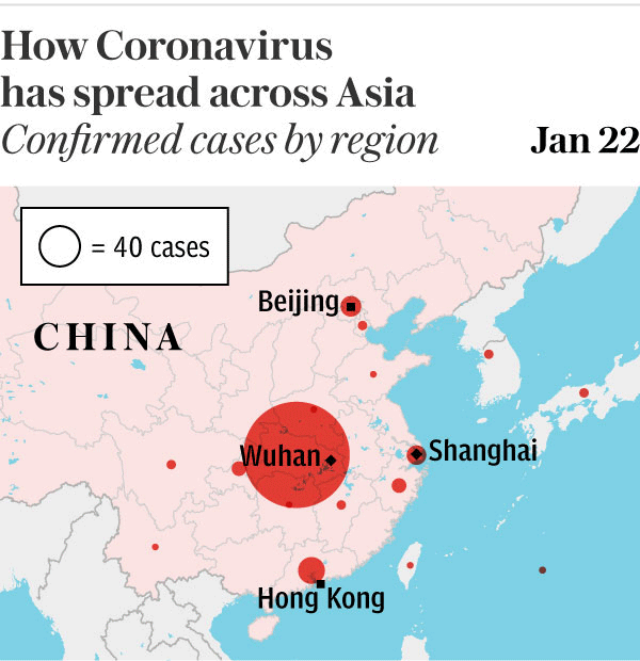
Prof Yvonne Doyle, PHE medical director, said "Our view is that, although airports are important, the most likely place that we might find a case is somebody in the country already, and it's absolutely critical that the public health service and the NHS are ready to diagnose that and are able to designate the person to the right facilities. That's the most likely scenario we are dealing with."
The Foreign Office is drafting plans to extract British nationals stranded by the coronavirus outbreak in Wuhan.
Ministers are working to get Britons out of Hubei province, which has effectively been shut down by Chinese authorities in a bid to contain the virus.
In an updated statement, the Foreign Office on Monday said anyone in the province who needs assistance can call a 24-hour helpline.
A spokesman said: "We are working to make an option available for British nationals to leave Hubei province due to the heavy travel restrictions and increased difficulty of accessing consular or medical assistance.
"The safety and security of British nationals is our number one priority.
"We continue to monitor developments closely and are in close touch with the Chinese authorities."

Prime Minister Boris Johnson's official spokesman said: "The Foreign Office are in close contact with international partners, including the US and European countries, to investigate possible solutions."
The Foreign Office recently updated its guidance to "advise against all travel to Hubei province", which has been on lockdown for several days.
But the guidance also added: "If you are in this area and able to leave, you should do so. This is due to the ongoing novel coronavirus outbreak."
Other countries including France, the United States and Japan have already mobilised plans to remove their citizens from Wuhan. The Spanish government also said on Monday it was planning to repatriate its citizens.
The announcement came after Jeremy Hunt, the former foreign secretary, suggested UK citizens could be airlifted from China.
Asked if he supported flying Britons back from Wuhan and elsewhere, he told BBC Radio 4's Today programme on Monday: "I think I would be very sympathetic and I'm sure the Foreign Office would be too."
NHS could be affected by 'knock-on impact'
Mr Hunt said the NHS was well-equipped to deal with patients returning with the virus but warned that it could strain the service.
"This is a very difficult time of year for the NHS - it is the most difficult time. But, again, my experience is that the NHS does know how to cope with these kinds of emergencies. I think the thing that will be difficult is the knock-on impact on other NHS services," he said.
"I think it would be very, very challenging for the NHS in terms of the regular workload but I have absolutely no doubt that, when it comes to doing what comes to necessary to isolate the virus and keep the public safe, our doctors and nurses will do exactly what they need to do."
Public Health England chief: Cases likely here
Earlier on Monday, the medical director of Public Health England, Yvonne Doyle, said she would be "surprised" if coronavirus cases were not soon confirmed in Britain.
As of Sunday, 52 people across England, Wales, Scotland and Northern Ireland have been tested for the deadly flu-like virus but all have returned negative. On Monday, health officials said 73 had been tested but none were positive.
Prof Doyle told the Today programme: "The important thing here is to be aware of the case definition of what constitutes a risk to the person and to the population.
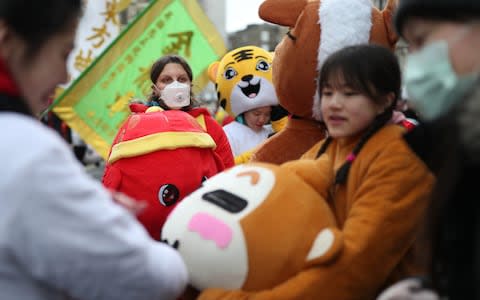
"So if somebody is unwell..if they have a cough, if they have fever, difficulty breathing and of course if they have been connected to Wuhan those are the four criteria.
"Otherwise we have a lot of people who are just very worried but well."
Prof Doyle said efforts were continuing to trace the 2,000 people who have entered the UK from China on international flights.
"We are now looking back to see whether any of them are still in the country, because some of them will have returned to China, but there are moves to identify them," she said.
"It's not always possible to find everybody but we are working to our best endeavours."
England's chief medical officer Professor Chris Whitty also said there was a "fair chance" cases would emerge in Britain as the overall number reported around the world climbed to about 2,744 including 80 deaths, which have all occurred in China.
The current risk to the public remains low, the health department said, adding that the Government is continuing to monitor the situation closely.
'Silence is disconcerting', say Britons in Wuhan
Britons inside Wuhan have told of "struggles" to make contact with UK authorities. A pair of British teachers who have been working in Wuhan say they have not left their apartment for five days, that all transport has been stopped and "there is no place to go" and "so we are pretty much stuck".
Jason Neal and Sophie Hunt told BBC Breakfast said there had been no reassurance from the British authorities whom they have "struggled" to contact, possibly because of the time difference and them being closed over the weekend.

They have about five days of food left and are keeping in touch with colleagues online while the scene outside is now like a "ghost town".
Mr Neal said: "Even if the news is just to sit tight and nothing is going to change - I think it is just the silence that is disconcerting.
"We have not heard anything from outside of Wuhan for a week now."
Briton back from Wuhan: 'I'm potentially a risk'
Mathematics teacher David Marland, 34, told the Telegraph how he knew he had to call a doctor when he stepped off a plane at Gatwick Airport last week.
For the past decade Mr Marland has lived and worked in Wuhan, the Chinese city at the centre of a dangerous epidemic that shows few signs of slowing down.
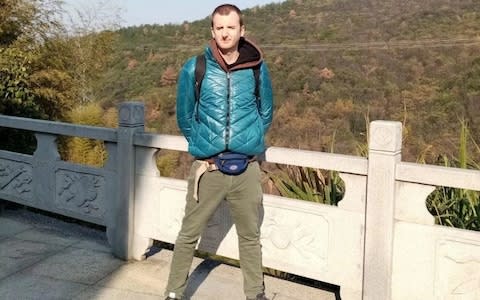
What’s more, Mr Marland lives only five minutes from the seafood market suspected to be the source of the virus, and walks through it nearly every day. Indeed a coronavirus case was recently confirmed in his apartment block.
But when he called the NHS 111 helpline, as suspected carriers have been advised to do, the answer was unexpected.
Instead of being called in immediately for a test, he says he was asked only if he had “the sniffles”. When he replied in the negative, the specialist on the other end of the line told him to call back if he started feeling unwell. With that, the conversation was over.
On Sunday, Mr Marland, 34, learned that the advice given to him may simply have been wrong. In a surprise announcement, Chinese officials suggested that carriers of coronavirus can actually spread the disease for up to two weeks without displaying any symptoms.
If the Chinese are right, Mr Marland fears he and other potential carriers might be unwittingly carrying the deadly virus, and potentially spreading it to the public. Even his own relatives have asked him to stay away for fear of contracting the disease themselves.
“I’m potentially a risk to other people,” he told the Telegraph.
“I’m still within the two week period so I could be spreading the disease everywhere without having any symptoms.”
Can screening at transport hubs control it?
Numerous countries across the globe, including the UK, have introduced screening at airports in an attempt to identify people who may have coronavirus symptoms.
But the limit here is that only those who are already ill will be picked up. So health experts say the most effective way to control the spread of viruses is an alert health system and high standards of infection control.
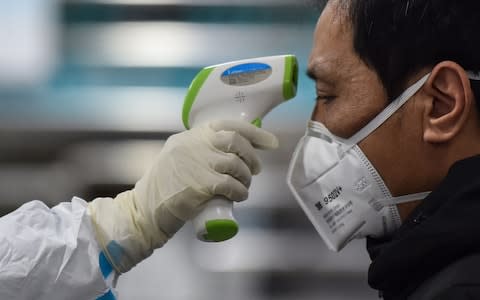
Prof David Heymann, infectious disease expert at the London School of Hygiene and Tropical Medicine, said that perhaps the most valuable element of airport screening is telling passengers about the signs and symptoms of a disease and what they should do if they’re worried.
“Educating the public is key,” he told The Telegraph.
Do face masks work?
People wearing face masks have become a defining image of large disease outbreaks, and this one is no different, with cities in Asia already reporting shortages as masks fly off the shelves.
But in reality, the thin material masks do little to stop a respiratory virus spreading.
“The face masks that we see people wearing are surgical face masks,” said Dr Mark Parrish, regional medical director of the medical and travel security firm International SOS. “As you breathe in and out you're breathing air from outside the face mask. So it will stop a little bit but not hugely.”
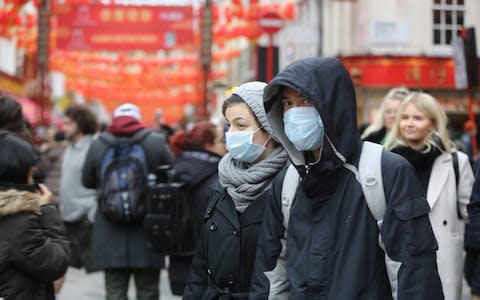
Jonathan Ball, professor of molecular virology at the University of Nottingham, added that face masks were proven to be effective in hospitals.
“There are reports in literature that face masks in a hospital setting can protect health care workers. But there, they are being used for short periods by trained professions,changed frequently and properly disposed of. Those staff are also adopting good personal hygiene.
“But in the general population it may even be the case that they’re not helpful at all,” he added.
“If you don’t change them regularly enough, they could potentially start to trap viruses and eventually they can move through that mask into your respiratory tract.”
Dr Parrish added that heavy duty masks, called N95's, are far more effective than simple surgical masks for the general population. But these aren't fool-proof either.
“These cause a tight seal around your nose and mouth so becomes harder to breathe air in - you don’t really want to give people with respiratory systems,” he said.
Is there a vaccine?
There is currently no vaccine to protect against the novel coronavirus, although researchers in the US and China have already begun working on one, thanks to China's prompt sharing of the virus's genetic code.
However, any vaccine will not be available for up to a year and would most likely be given to health workers most at risk of contracting the virus.
For now, it is a case of containment. China has started building a 1,000-bed hospital to treat patients with the virus which it hopes to finish within days.

 Yahoo News
Yahoo News 